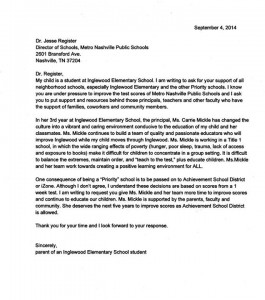In response to MNPS Director of Schools Jesse Register’s proposal to redesign schools in East Nashville into an “All-Choice” zone with more charters and schools turned over to the struggling Achievement School District, a group of parents in East Nashville calling itself East Nashville United is now asking for a review of a consultant’s report on Metro Schools.
ENU has previously called on Register to start over with any plan for East Nashville schools and more recently has asked for more time in order to allow for broader community input before a plan goes into place.
Register’s announcement of changes in East Nashville comes amid a report detailing the increased costs charter schools impose on MNPS and reports out of Memphis that rather than turn more schools in that district’s Innovation Zone, the Director of Schools there is seeking to “double down” on what’s working: District management of schools with increased investment, support, and flexibility.
Here’s East Nashville United’s latest press release, calling on Register to revisit the report of the Tribal Consulting Group as a basis for any new plan for East Nashville schools:
An organized group of East Nashville residents is calling on Nashville schools to re-examine a consultant’s series of reports on some of the city’s struggling schools.
The request by East Nashville United—the parent-led coalition formed in September after the abrupt announcement of sweeping changes to East Nashville schools—asks Metro Nashville Public Schools Director Jesse Register to brief the school board and the public on how, or if, MNPS addressed the detailed findings laid out in the reports.
MNPS paid the Tribal Group, a British Consulting Group, $3.5 million to study nearly 40 schools, including Bailey, Jere Baxter and Gra Mar Middle Schools and Stratford and Maplewood High Schools. Although the reports provide a wealth of information on the challenges each school faces, MNPS has been noticeably silent on the Tribal Group’s evaluations. In fact, last year MNPS rejected media efforts to obtain a copy of one of the group’s reports assessing the central office.
http://www.nashvillescene.com/
John Haubenreich, the chair of East Nashville United (ENU), says that MNPS can’t dismiss the findings of its own paid consultant.
“We’ve heard so much talk of school closings, charter conversions and a rash All-Choice plan that would divide neighborhoods,” Haubenreich said. “What we’re asking for instead is a serious look at the needs of our schools and how we can provide them. The Tribal reports provide as good a starting place as any.”
Haubenreich says that Dr. Register must address the problems underscored by the group’s findings. For example, at last week’s community meeting at Jere Baxter Middle School, a teacher spoke of how the school, which hired a new principal this year, lacked stability. With the school in a constant state of transition, she said, it was difficult to develop plans to meet the needs of its students.
The Tribal report on Jere Baxter observed the same problem. In fact, the report, conducted in 2011, noted that a recent shift to a new education model “brought considerable uncertainty to the school.” The report also noted that it was challenging for the school to “develop continual improvement against a background of significant change.”
Haubenreich says East Nashville United welcomes an East Nashville plan, as long as it builds on genuine community input and critical information already available.
“What we have asked for from Day 1 is a methodical, community-driven blueprint for our schools,” Haubenreich says. “We think the Tribal reports offer useful information from our teachers and students, both about their schools and central administration. Why would we develop a plan that doesn’t take advantage of that?”
The Tribal reports provide distinct portraits of each school. They show the effectiveness of the leadership, the concerns of the teachers and, in general, the culture of the school. They also examine the quality of instruction, the use of data and the distinct behavioral issues each school faces. Most of all, the Tribal reports lay out detailed “areas of improvement” that could shape a strategy to close the performance gap of low-income children. (You can read the reports here.)
In light of the renewed attention focused on the consultant’s reports, Jai Sanders, one of the founding members of East Nashville United, says that MNPS should brief the school board and the public about the findings of the Tribal Group.
“We’re actually stunned this hasn’t been done already. We have detailed reports about several East Nashville Schools and we don’t know how MNPS addressed these findings,” says Sanders, a parent at Inglewood Elementary.
“Sometimes we feel like the leadership at MNPS is juggling ideas around with no real strategy, moving on whatever it heard last,” he says. “Revisiting the Tribal reports is a good way for MNPS to regain credibility.”
Last week East Nashville United called on Dr. Register to push back his plan to reorganize schools in East Nashville. Register has said his plan will be finalized by January 1st. ENU wants MNPS to use remainder of the school year to develop a thorough, transparent plan that addresses the diverse needs of its unique schools.
NOTE: John Haubenreich, Chair of East Nashville United, is a contributor to TN Ed Report.
For more on Tennessee education politics and policy, follow @TNEdReport
